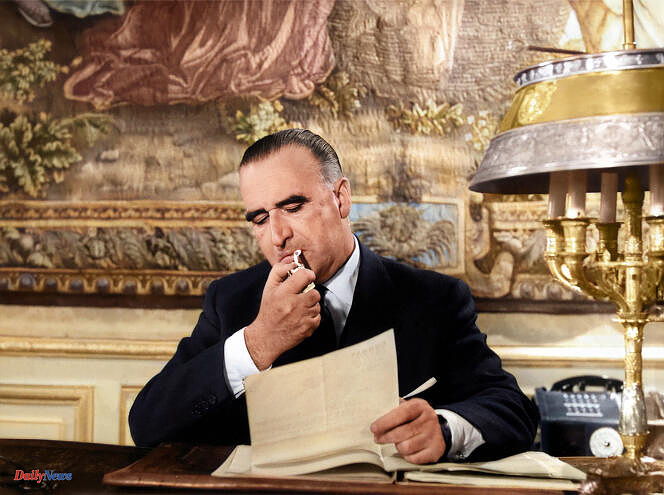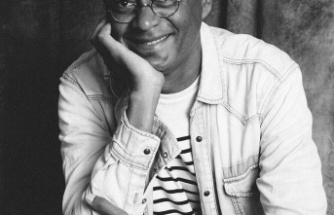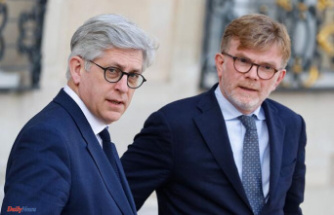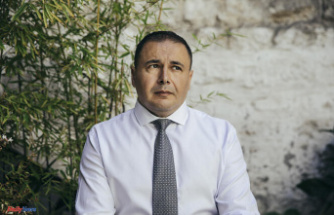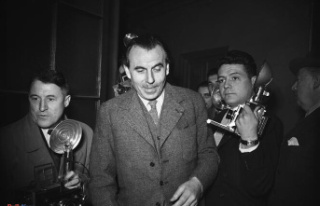After the unforgettable credits of “Dossiers de l’screen” (music by Morton Gould), Alain Jérôme presents the evening’s film and the experts who will debate it, on the second ORTF channel. Suddenly, the show stops. Journalist Philippe Harrouard informs the French of the death of Georges Pompidou, the head of state, which occurred on April 2, 1974, at 9 p.m., at his home on Île Saint-Louis, in Paris. Léon Zitrone, journalist and commentator on major events, tries to deal with the panic: “We are going to improvise. No one expected it. » And we can indeed see the official television editorial team taken by surprise!
From the start of this documentary dedicated to the second president of the Fifth Republic, half a century after his death, we measure the time that has passed and the change in morals. Who could, today, be surprised that a president, disfigured by cortisone for months, whose speech was punctuated by longer and longer silences, did not end up dying on stage? Who would believe the repeated denials of ministers and the pretext of a “flu”? What journalist would “improvise” in such circumstances?
Although we know it, it remains a surprise, in this otherwise classic documentary. The portrait is accurate, quite touching, illustrated with little-known photographs of youth, but here is a man with almost no faults, thrown into the arena of politics, whose cruelty will cost him his life. The summary may seem caricatured. In the absence of less empathetic views or testimonies, this impression remains.
Fake scandal
Rightly placed under the sign of the founding relationship between de Gaulle and Pompidou, it omits nothing of the hostility of the Gaullists towards a man who had committed the double sin of having ignored the Resistance and chosen money – he was general director of the Rothschild bank. But, finally, he was not alone against everyone! The “diabolicals”, Marie-France Garaud and Pierre Juillet, only pass by, rifle in hand, Edouard Balladur is barely mentioned. This is little.
The relationship of the close couple formed by Georges Pompidou, son of teachers, and Claude Cahour (1912-2007), from a family of notables, married at 24 (for him) and at 23 (for her), is illustrated with rare images. While their walk takes them to the edge of a cliff, Claude wants to step back, cites his dizziness and ends up dragging his husband away from the danger. What, deep down, she could not have done in life.
Whoever or those who hatched a false scandal, after the death, in 1968, of Stevan Markovic, Yugoslav political refugee, thug and blackmailer, but above all former handyman of Alain Delon and lover of his wife, Nathalie, knew this perfectly. Ms. Pompidou was the victim of a fabricated rumor, according to which the wife of the former prime minister had participated in “fine games.” Gross fake news, we would say in contemporary English.
Georges Pompidou never quite recovered, although he transformed this pain into rage and this tiger-like fury into political ambition. No doubt the normalien, a graduate of classics, had the skills for this. His appetite for happiness, his epicureanism – he spent money with greed and ease –, his taste for art were not enough to spare him the tragedy of existence. And, indeed, the cruelty of politics. After toying with his resignation, he loses. De Gaulle, genius of the word, puts him "in reserve for the Republic", as one dismisses a good servant who has stayed too long at Matignon: "Six and a half years in office!, launches the president, raising his index finger, a duration which n 'has no sort of precedent for four generations! »
Shortened mandate
The comedy of power turns into drama. Waldenström's disease, a rare cancer, showed its first signs that summer, without his knowledge. Pompidou felt betrayed during the Markovic affair, he was and clearly displays his desire to succeed the General. On a private visit to the Vatican in January 1969 with Paul VI, he assured during an “off” with journalists that “it is not a mystery to anyone”. Violent reaction from De Gaulle.
The ensuing controversies are settled for history. The scene, found, appears in the documentary. We even see the bodyguard, behind the former prime minister, holding out a microphone. The intention is clear. And he would be elected in June 1969, after the disaster of the referendum wanted by de Gaulle, by 58.2% of the French.
The shortened mandate of Georges Pompidou, still almost a five-year term, remains engraved in the collective memory as that of the industrial modernization of France, indissolubly linked to the “thirty glorious years”. The modern and contemporary art center that bears his name in Paris, located on the square of the same name, has long silenced the controversies linked to its colorful pipes. The image of the most famous Auvergnat in Paris, clear and piercing gaze under bushy black eyebrows, an eternal cigarette screwed to his lips, has been imprinted on the retinas of the French. Let us add that the voice of Denis Podalydès admirably accompanies this epic, which should appeal beyond an audience of baby boomers.

